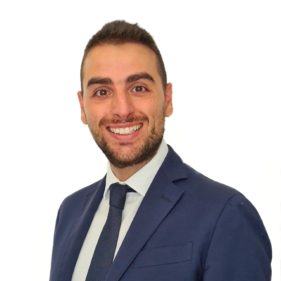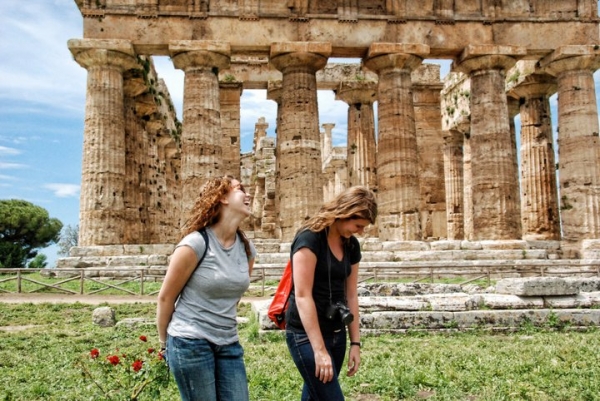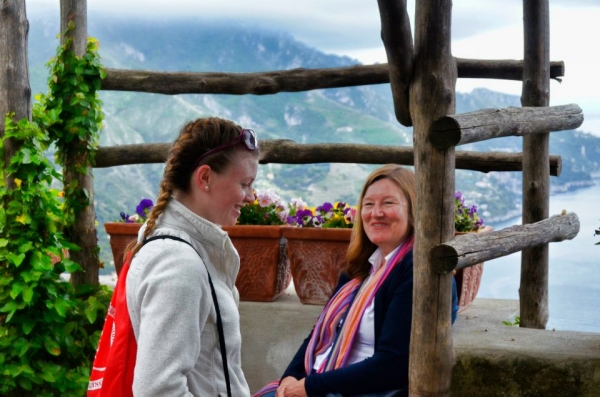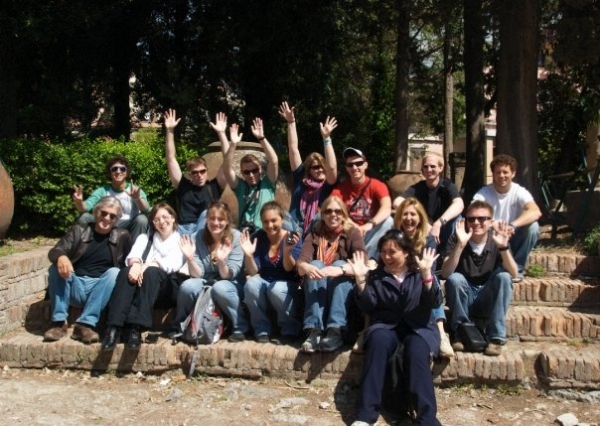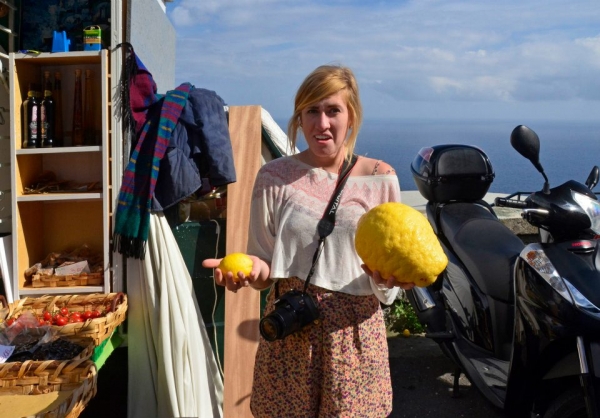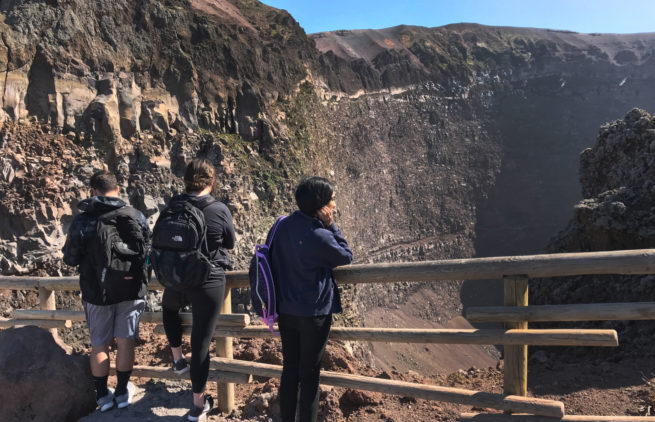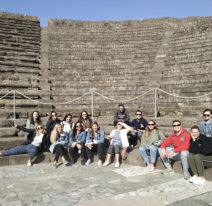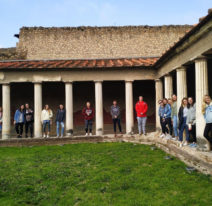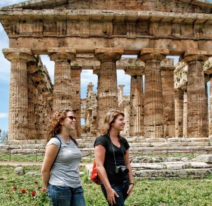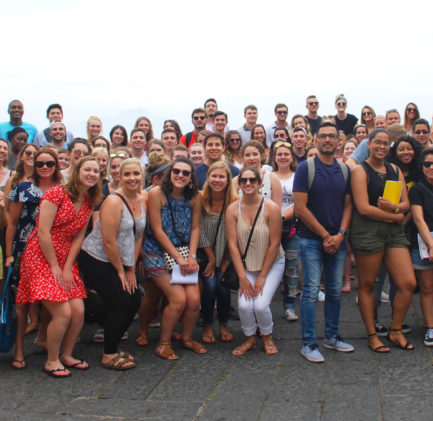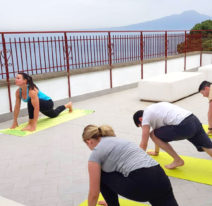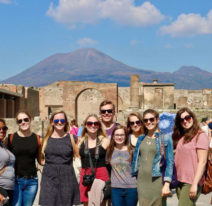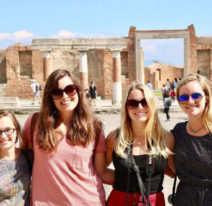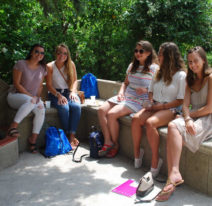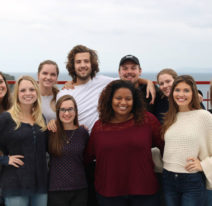COURSES
Warning: foreach() argument must be of type array|object, string given in /web/htdocs/www.santannainstitute.com/home/wp-content/plugins/builderpress/inc/elements/general/accordion/tpl/layout-1.php on line 24
45 hours, 3 credits
Prof. Davide De Gennaro
The course presents concepts of tourism relating to food and geography, using Italy as its example. The course is relevant to students of all backgrounds but was designed specifically for students studying hospitality, business, and culinary arts. Students will study international organizations operating in tourism (i.e. WTO) and the different types of tourism with particular attention paid to sustainable tourism.
Students will be asked to investigate the tourism geography of Italy, becoming familiar with the most important tourist sites in Italy and Campania through several excursions. The third module of the course will be dedicated to a very important kind of tourism in Italy and the Campania region: Food and Wine Tourism.
45 hours, 3 credits
The focus of this course is the study of the entrepreneur and the entrepreneurial start-up process. Areas of concentration include searching for new venture opportunities and the evaluation of the viability and attractiveness of the new venture, determining the resources required and the sources of those resources, and developing a business plan appropriate for presentation to funding sources.
COURSE AND PROGRAM LEARNING OUTCOMES
Upon successful completion of this course students will be able to demonstrate the following:
- Identify the role of the entrepreneur in a market economy
- Demonstrate understanding of various components of entrepreneurial activity in practice through a written report and presentation
- Apply economic reasoning as it relates to policies impacting entrepreneurship
- Explain the impact of various institutions on entrepreneurial activity in the short run and long run
- Evaluate various public policies for their effect on entrepreneurial activity
45 hours, 3 credits
This course provides an introduction to basic marketing concepts. Topics include the marketing mix, new product development, consumer behavior, customer relationship management, strategic planning, and e-commerce. Students will develop a comprehensive marketing plan and apply course concepts to real and imaginary products.
Learning Goals
The content of this course addresses the following goals:
- Professional competency and professional identity
- Strong communication and interpersonal skills
- Diverse and global perspectives
- Commitment to ethical practices and service
45 hours, 3 credits
This course is an introduction to microeconomics, the field of economics that deals with issues that affect individual markets, business firms, and households. Students learn about profit maximization, consumer theory, factor markets, the public sector, and the distribution of income. A significant portion of the course is devoted to the study of markets, market futures, and society’s attempts to improve upon market outcomes under various market structures, including perfect competition, monopoly, monopolistic competition, and oligopoly.
45 hours, 3 credits
Hospitality is one of the largest service industries in the world. This course is about hospitality management and will provide an overview of basic professional management and illustrate customer service in the major areas of hospitality management, and segments of travel and tourism. The course will have a focus on the characteristics of the Italian market. Italy is one of the most popular global tourism destinations, and differently from other markets the local hospitality industry is still largely dominated by independent operators with limited presence of international groups and brands. The course will illustrate the current approach and methodologies for management of hotels and other tourism organizations. The key elements of service management and customer experience will be illustrated with examples, case studies and meetings with guest speakers. Students will discuss the latest developments, news and challenges in the hospitality business.
45 contact hrs, 3 credits
This course is meticulously crafted to offer students a deep dive into the strategic and operational elements of managing human capital in organizations of all sizes and types. In today’s rapidly changing business environment, where talent has become a key competitive advantage, effective HRM practices are crucial for organizational success. This course provides a comprehensive exploration of the core functions of HRM, including talent acquisition, employee development, performance management, compensation and benefits, and employee relations, within the framework of contemporary business challenges and legal considerations.
45 hours, 4 credit
Prof. Davide De Gennaro
This course is intended to provide students with a comprehensive introduction to business in the European Union. The course describes how economic, political, and social factors interrelate and influence business in Europe. Students will use a framework to research sustainable business practices from different European Union member states’ perspectives. Guest lecturers and field trips are planned for students enrolled in the study abroad program.
Student Learning Objectives
At the end of the course the student will be able to do the following:
- Analyze the origins, history, and development of the EU to the point of enlargement
- Identify important steps in EU integration, name EU institutions, and understand how they interact with one another
- Analyze the impact of the social and cultural influences brought about by the enlargement of the EU
- Determine how business and trade are conducted both internally and externally by the organizations of the EU
- Conduct a sustainable business analysis (SWOT) for a specific industry sector operating in Italy
- Analyze how companies should react and position themselves strategically and operationally responding to key issues in Europe’s evolving sustainable business environment
45 hours, 3 credits
Prof. Ivana di Leva
This course covers principles and applications of food marketing, focusing on current trends related to food production, distribution, consumption, and the dynamics characterizing food systems. The course will center on the importance of understanding consumer behavior as a key factor in strategic food marketing and on the role of different agents in the food channel, particularly food producers, distributors, wholesalers, retailers, and marketers. This course also highlights the interface between producers and consumers (e.g. farm to table). As a result, part of the course will be dedicated to assessing the importance of issues related to food sourcing, including alternative venues such as local and regional sourcing, and food access. The delivery of this course includes live lectures, class discussions, case studies, field trips, and the creation of a marketing plan for an agricultural or food product.
45 contact hrs, 3 credits
This course is an immersive exploration into the dynamic interplay between individuals, groups, and structures within organizational contexts. It offers a profound understanding of how human behavior affects organizational effectiveness and efficiency, drawing from a range of disciplines including psychology, sociology, communication, and management. The course is designed to equip students with both the theoretical frameworks and the practical skills necessary to analyze and improve workplace environments and outcomes.
Starting with an in-depth look at individual behavior, the course examines how personality, emotions, perceptions, and values influence employees’ actions and attitudes. Special attention is given to motivation theories and their application in designing jobs and rewards systems that enhance performance and satisfaction.
45 contact hrs, 3 credits
This course offers a deep dive into the intricate world of corporate finance, providing students with a thorough grounding in its principles, theories, and real-world applications. As a vital component of business education, this course is meticulously designed to bridge the gap between theoretical financial principles and the practical challenges faced by today’s financial managers and corporate decision-makers.
Beginning with an exploration of the fundamental concepts of finance, such as the time value of money and the cost of capital, students will learn how these principles underpin all financial decision-making processes. The course emphasizes the importance of understanding risk and return dynamics, guiding students through the complexities of financial markets and instruments.
A significant portion of the curriculum is dedicated to investment decision-making, with detailed examination of capital budgeting techniques such as Net Present Value (NPV), Internal Rate of Return (IRR), and Payback Period. Students will learn to evaluate investment projects, considering not only their potential returns but also the inherent risks and the strategic fit within the company’s overall objectives.
Faculty
Davide De Gennaro
Head of Department of Management and MarketingSara Cacace
Economics and FinanceAlessandro Fiorentino
Hospitality and TourismOur Mission
Sant'Anna's mission is to educate, support, and inspire international students to become active citizens of the world. We are committed to academic excellence within an authentic and engaging Italian community.Discover Sant'Anna
Mission and GoalsAt Sant’Anna we strive to provide students from across the world a unique, hands-on learning experience where they can cultivate real world skills and knowledge.
Because the school is located in Sorrento, one of the most harmonious cities southern Italy has to offer, our students are truly able to gain a global awareness and appreciate diversity while studying abroad. Our goal is to help guide participating students into becoming responsible, open-minded members of society.
Our hope is that each student can leave Sant’Anna with an appreciation of the Italian culture as well as the knowledge acquired through their academic courses.
We are so passionate about the importance of international education and training in a student’s academic career, and we are dedicated to doing whatever it takes to providing students with a life changing experience.
Warning: Undefined array key "title" in /web/htdocs/www.santannainstitute.com/home/wp-content/plugins/builderpress/inc/elements/general/grid-images/tpl/layout-1.php on line 29
Warning: Undefined array key "title" in /web/htdocs/www.santannainstitute.com/home/wp-content/plugins/builderpress/inc/elements/general/grid-images/tpl/layout-1.php on line 29
Warning: Undefined array key "title" in /web/htdocs/www.santannainstitute.com/home/wp-content/plugins/builderpress/inc/elements/general/grid-images/tpl/layout-1.php on line 29
Warning: Undefined array key "title" in /web/htdocs/www.santannainstitute.com/home/wp-content/plugins/builderpress/inc/elements/general/grid-images/tpl/layout-1.php on line 29
Learning
Mediterranean Location
Our LocationWhy choose Sorrento?
Study abroad programs in Italy have traditionally focused on the popular cultural centers of Rome, Florence, Milan, and other cities in the north of Italy. At Sant’Anna Institute, study abroad students have the opportunity to experience the unique culture, customs, and climate of southern Italy.
Sant’Anna is located in the stunning town of Sorrento at the beginning of the Amalfi Coast, just 20 miles south of Naples. Perched atop hundred foot cliffs that face the Gulf of Naples, Sorrento is within sight of rugged snow-capped mountains, emerald waters, black sand beaches, cliff- hanging villages, and the world’s best known volcano: Vesuvius.
Sorrento is a safe, walkable, and picturesque center of international tourism. It has an international population, making it a small town, with a cosmopolitan feel.
Sorrento also boasts:
- Friendly, gracious people
- Southern hospitality
- Italian style
- Bustling shopping streets and traditional Roman-style alleys
- A mild, sun-drenched Mediterranean climate
- Culinary traditions based on the seafood, and locally grown, fresh produce
- Streets lined with lemon and orange trees
- Hillsides covered with olive groves and vineyards
- Home to some of the best pizza and gelato you will find anywhere
Sorrento is a treasure all its own and a passageway to the:
- tunning islands of Capri and Ischia
- baroque splendor of Naples
- majestic Greek temples at Paestum
- historic Roman ruins of Pompeii and Herculaneum
- world-famous collection at the National Archaeological Museum in Naples
- cliff hanging villages of the Amalfi Coast, like Positano, Amalfi and Ravello
- world’s best known volcano, Mount Vesuvius
It’s the perfect city to discover a home away from home with a hometown feel!
Sant’Anna Institute is located overlooking the Marina Grande of Sorrento, perched on the cliffside with stunning views from the sea-facing windows, and it’s a short walk to the harbor and the harbor-side restaurants.
The Institute is located a short 15-minute walk from the center of town and 20 minutes from the Sorrento train and bus station.
The Residence Hall was established in 2017 and is on the third and fourth floors of the Institute, overlooking the picturesque Marina Grande.



